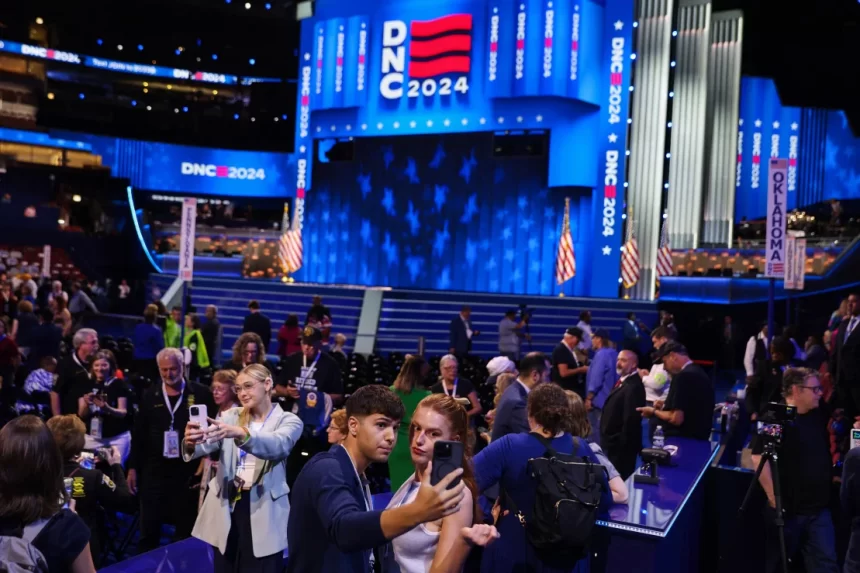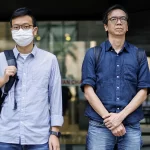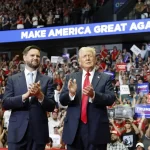At the Democratic National Convention creators’ lounge for digital influencers, the cookies are a big hit.
Sure, there’s the ones bearing Vice President Kamala Harris and Minnesota Gov. Tim Walz’s faces, but the most popular baked snack is lime green, topped with the phrase “To the window, to the Walz,” a cheeky Walz-take on the millennial hit “Get Low” by Lil Jon, who made a cameo appearance Tuesday night at the Chicago convention.
In the creators’ lounge, digital influencers can sip on drinks, enjoy food, and have a dedicated workspace for the reason they’ve gathered at the DNC — posting on social media in support of Harris. Many creators, channeling more sophisticated broadcast outlets, have set up mobile lighting rigs to record selfies and group videos in the lounge.
For the first time, more than 200 influencers have been credentialed to attend the four-day Democratic convention and are being specifically catered to, with an exclusive lounge and creator platform section in the arena where they can record and post online. Party officials have assigned dedicated staff to help influencers get around, conduct interviews and create online content, arming the coconut-pilled creators with everything they need to create meme magic. Each night of the convention will also feature an influencer on stage as a speaker.
The Republican National Convention also invited digital content creators to attend its convention last month in Milwaukee and hosted a creator hub with more than 70 influencers participating in their official program.
With traditional television viewership dropping and news outlets struggling to reorient their businesses, political campaigns are increasingly leaning on influencers to get their message to voters.
Deja Foxx, a social media influencer from Arizona who spoke on the first night of the convention, told CNN’s Jim Acosta the 2024 election is a “historic vibe switch.”
“Not only are young people going to show their power at the ballot box, but young people are demonstrating the narrative power that we now hold,” said Foxx, who has amassed more than 140,000 followers on TikTok. “We are setting the narrative, even for traditional media — with our TikTok videos, with the things we create online.”
Ahead of the convention, DNC officials proactively reached out to online influencers, offering press credentials to attend the massive gathering. For the hundreds of creators who traveled to Chicago, many are either paying their own way or have secured funding from organizations or sponsors.
And it’s not just social media stars with millions of followers or politics-focused creators attending the convention.
‘They don’t watch the news’
Jeremy Jacobowitz is more likely to be seen on Instagram or TikTok stuffing his face with food than posting about the 2024 election. But, when he was approached by Democratic officials about the opportunity to attend, he decided to apply.
“The audience that I’m reaching, this is what they watch,” he told CNN. “They don’t have cable; they don’t watch the news; they don’t even read the news; they don’t even trust the news anymore. They’ll trust us more than mainstream media, unfortunately.”
Jacobowitz, who has over 500,000 followers on Instagram and 315,000 on TikTok, said he wants people to understand where the information he’s sharing is coming from, and then act on it – even though he realizes not everyone will.
“Even if 5% of people listen to me, that’s, that’s the election. It’s all margins,” he said. “So I don’t need everybody to listen to me or hear what I’m saying to cut through.”
Malynda Hale, who has more than 90,000 followers across TikTok and Instagram, pushed back on any notion that the influencers are being controlled by the Democratic party, stressing that there were no restrictions on what they post.
“We’re the direct line to that demographic they’re trying to reach and getting [voters] involved. And if my content will get more people to vote and my content will get people to be involved in the issues and care more, then use me,” Hale said.
But that’s the big question. Will the party’s courting of social media influencers translate into votes?
Mia Logan, a senior vice president at the political consultancy Precision Strategies, said the efforts can have an impact if the campaign can sustain the excitement. Logan, who is also serving as a producer for influencer segments on the convention stage, told CNN she’s hoping the campaign will come up with more creative ways to turn viewers into voters.
“They’re going to have to continue to keep up that drumbeat and must continue engaging with them into the fall, doing things like interviews, bringing creators into the process,” Logan said. “I’d love to see a creator as a campaign embed, thinking of new and interesting ways to give people a different point of view.”










